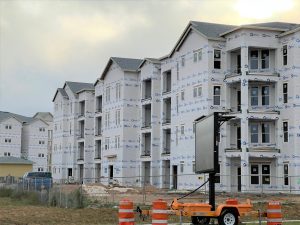New worries, measures
 While Florida leads the nation in a lot of positive economic indicators such as population growth, job growth, and low unemployment, the cost of housing – affordable housing – has become a real challenge. It’s gaining attention among state policymakers and is the focus of this week’s Florida Economic News.
While Florida leads the nation in a lot of positive economic indicators such as population growth, job growth, and low unemployment, the cost of housing – affordable housing – has become a real challenge. It’s gaining attention among state policymakers and is the focus of this week’s Florida Economic News.
Affordable Housing Crunch: The House Local Administration, Federal Affairs & Special Districts Subcommittee met recently to discuss at length the growing affordable housing problem in Florida and two key programs: the State Housing Initiatives Partnership (SHIP) and the State Apartment Incentive Loan (SAIL) programs. In a survey, the Florida Housing Finance Corporation found that nearly 1.3 million Floridians spend more than 50% of their income on housing, higher than the 30% guideline to maintain stable housing. This statistic is especially true for non-homeowners as Florida has about 76,000 low-income cost burdened renters in the market. In these rental properties, about 78% of residents are active participants in the workforce, while the other 22% are mostly elders and individuals with disabilities. SHIP is supported by the Local Housing Trust Fund and has expended $685 million assisting nearly 37,000 households in Florida. SAIL is supported by the State Housing Trust Fund and is mainly targeted toward developers to make it feasible for them to include affordable housing components within their developments.
Florida’s Planned Fix: The affordable housing problem in Florida is a top priority of Senate President Kathleen Passidomo (R-Naples), a real estate attorney. She is supporting SB 102 by Senator Alexis Calatayud (R-Miami) called the “Live Local Act.” It seeks to make it possible for workers to live near their place of employment, a challenge especially in Florida’s bigger cities. The bill would provide incentives for private investment in affordable housing, offer flexible housing regulations that encourage mixed-use development in struggling commercial areas, and prevent local rent controls such as those passed by voters in Orlando. The Governor said recently that he expects he’ll be able to support the measure. The bill, if it becomes law, would boost the state’s current budget for affordable housing from $363 million to $811 million in total. SB 102 is being fast tracked and will be heard by the Senate Community Affairs Committee this Wednesday (February 8) and if approved, will have only one more committee stop (Senate Appropriations) before going before the full Senate.
Survey Says: Six of the 10 most overvalued housing markets in the nation are right here in Florida, according to the latest report from researchers at Florida Atlantic University and Florida International University. Cape Coral-Fort Myers ranks #1, with buyers paying 62.29% more than they should, based on the sales history in that market. The other Florida markets in the top 10 are:
- #2 Deltona (a 55.51% premium);
- #4 Palm Bay-Melbourne (54.55%);
- #6 Tampa (53.54%);
- #7 Lakeland (51.99%); and
- #10 North Port-Bradenton (48.41%).
The other metros in the top 10 are Atlanta (#3), Charlotte (#5), Boise, Idaho (#8), and Las Vegas (#9). “It used to be that you didn’t need a big salary to afford a home in the Sunshine State, but those days are over because this has become a market mostly for move-up buyers and empty nesters,” said Dr. Ken Johnson, a real estate economist at FAU’s College of Business. “Florida’s relatively low incomes should make housing affordability a key issue for a long time.”
LMA Newsletter of 2-6-23

